A push for safe spaces in courts for victims of child trafficking
CSOs working with victims of child trafficking have repeatedly voiced concern that traffickers are not reprimanded or prosecuted when they are arrested.
TRAFFICKING IN PERSONS
KAMPALA - When handling cases of trafficking in persons involving minors, Ugandan courts should have the discretion to analyse and decide which child's evidence requires corroboration, Lady Justice Damalie Lwanga, the executive director of the Judicial Training Institute (JTI), has said.
It should be so because currently the legal requirement for corroboration of evidence of children of tender years affects some children's access to justice through unjust disqualification of their evidence, she underlined.
This was part of Lwanga's presentation during an exhaustive dialogue of civil society organisations with judicial officers on the issue of trafficking in persons on Wednesday.
The meeting, which fittingly took place at JTI and held in observance of the social distancing and mask wearing guidelines to prevent the potential spread of the coronavirus, was themed around the need to empower courtrooms to deliberately create safe spaces and observe protection of victims of trafficking and abused children.
Among other functions, the institute, established in 2017, provides training to Judiciary staff and staff of the Justice Law and Order institutions.
"In some cases, judicial officers fail to convict because of lack of corroboration," said Lwanga, who described the crime of trafficking in persons as a "unique offence" that "in most cases is continuous".
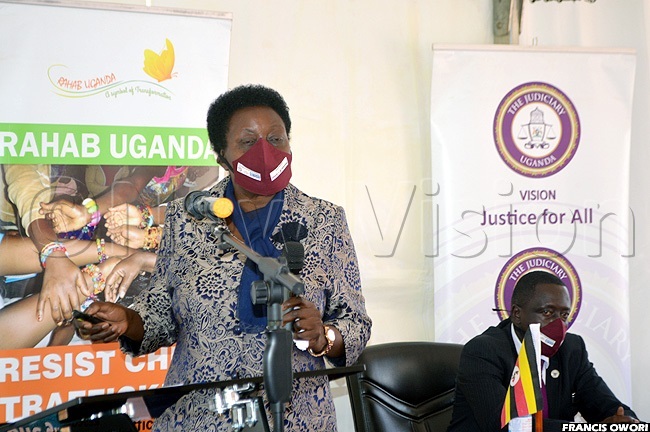
A 2018 report on countering trafficking in persons in Uganda revealed that most of the registered internal trafficking incidents in Uganda involved children, including 73 girls and 42 boys.
Yet, while there are statistically more cases of trafficking internally than cross-border, it is the latter cases that draw more attention, according to Damon Wamara, the executive director of Uganda Child Rights NGO Network (UCRNN).
Kampala and Wakiso districts are documented as the major destination areas for child victims of trafficking - for majorly street begging and child sex labour.
Here, children are seen by perpetrators as a lucrative source of income and an easy target, thus fueling the vice.
CSOs working with victims of child trafficking have repeatedly voiced concern that traffickers are not reprimanded or prosecuted when they are arrested.
In fact, the 2018 report underlined the laxity in the responding to cases of trafficking as one of obstacles standing in the way of efforts towards ending child exploitation. The inadequacies of judicial officers in the knowledge of the law against trafficking in persons was also pointed out as part of the problem.
"We [CSOs] want to be engaged with you [judicial officers]," Wamara, who has vast experience working with street-connected children, told the dialogue.
"Safe spaces need to be created from within the community right to the courts."
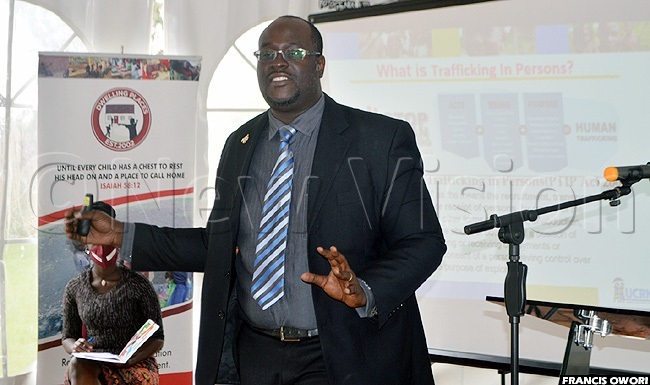
The meeting was organized by Rahab Uganda - an NGO that empowers sexually exploited girls - and Dwelling Places, a Christian-based organization that deals with street-connected children, in partnership with Terre des Hommes (TDH)-Netherlands.
"Over time, prosecution or hearing of cases involving trafficking of children has been a problem. Victim protection has been a challenge," said James Yesiga, the country manager of TDH-Netherlands.
Striking a tone of solidarity between CSOs and judicial officers, Yesiga also advanced an appeal to the latter to use their discretionary powers in the courts to create safe spaces for victims of child abuse and trafficking during court sessions.
And for this to work better, one of the key documents of reference advocated for during the dialogue is the Prevention of Trafficking in Persons (PTIP) Act 2009, whose regulations respond to child protection.
Tyler Dunman, the Special Counsel to the Director of Public Prosecutions, underlined the need for victim protection.
"We all have an obligation that the privacy and the confidentiality of victims are protected," he said.
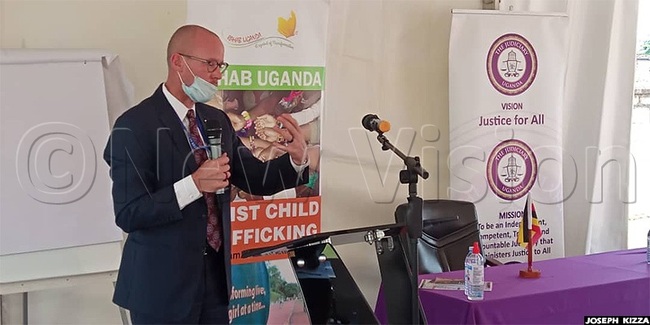
Drawing from the PTIP Act, Dunman said judicial officers are part of that responsibility, partly by way of in-camera (private) court proceedings - away from the prying eyes of the media.
He said the PTIP Act is an ideal document of reference for judicial officers handling cases of trafficking because it provides for a victim-centred and trauma-informed approach.
"When we listen to the victim, we are likely to involve them in the [judicial] process," said Dunman. "One of the things I do as a prosecutor is I always try to familiarise the victim with the process."
He also identified the Offence Charging Manual as a useful tool for judicial officers while evaluating cases.
Trafficking in persons attracts a prison sentence of 15 years upon conviction, as provided for by the PTIP Act while aggravated trafficking in persons carries a life imprisonment penalty tag.
Ten years in jail awaits you if you are found guilty of engaging the labour or services of a victim of trafficking in persons.
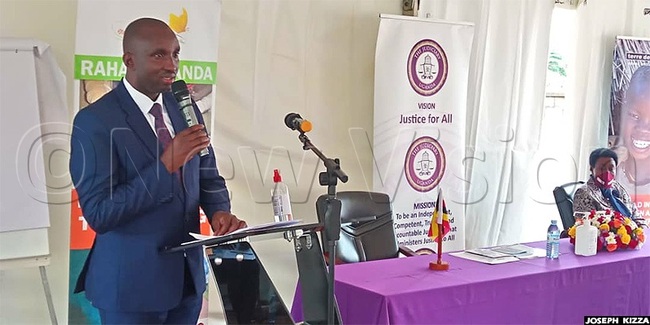
Despite the existing penalties for commission of the crime, human trafficking in Uganda has continued to be experienced over the years while the country remains the source of victims, according to the 2018 performance report mentioned earlier.
Two years ago, as many as 286 incidents related to trafficking in persons were registered in Uganda, which is both a transit and destination country for victims of the crime.
UCRNN's Wamara explained that trafficking in persons manifests as sexual exploitation, forced begging, domestic servitude, cattle herding and child labour.
Worryingly, he pointed out, what makes it such a lucrative business are such elements as the high profit, little investment and the commodity (victim) being easily disguised as not being part of a criminal enterprise.
Monique Kyamazima, the director of legal affairs at Willow International, said that trafficking rakes in $150b (about sh555 trillion) globally every year.
Yet while the perpetrators thrive, the victims implode - often silently - under the weight of their traumatic experiences.
"Trauma compromises most of the victims we meet," said Annette Kirabira, the country director of Rahab Uganda. "Some of the victims of exploitation have underlying trauma while most suffer shock and denial."
When people are exploited, they have so many layers of loss, she added.
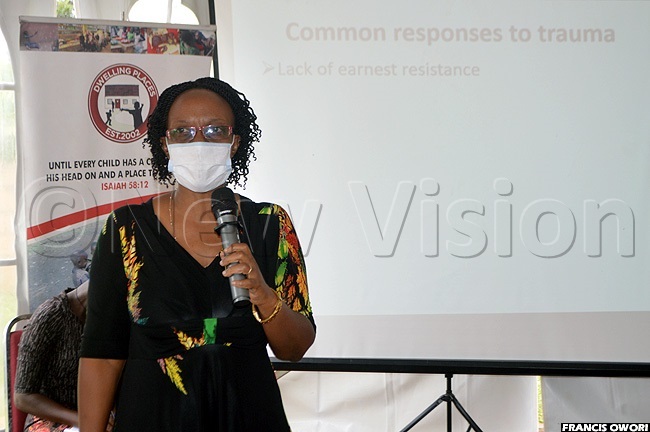
From her broad experience working with girls that have been sexually exploited, Kirabira, who is acounselling psychologist, pointed out some of the common responses to trauma as delayed disclosure, inconsistent memories and lack of earnest resistance.
She feels that prolonged research should be done to better understand the degree of trauma that exploited young people undergo.
"We need to undertake some studies. We must study the effect of two years of servitude of the Middle East on Uganda's youth," she said during the dialogue.
"Trauma interferes so much in good judgement. When they [victims] are in a phase of denial, they are quick to tell their stories.
"The way victims tell their story immediately after the experience may be different from when they are in touch with their true emotions and when they have gone through the [judicial] process," added Kirabira.
While the Rahab Uganda executive director urged judicial officers to afford victims a measure of choice and control when handling their cases, she felt that a self-care plan is equally important for the judges and magistrates.
The reason is clear: the traumatic experiences of the victims shared during court cases can have a psychological effect on the officers handling the cases.
Justice Duncan Gaswaga of the High Court agrees. "We take in a lot of things. We even get hallucinations," he said.
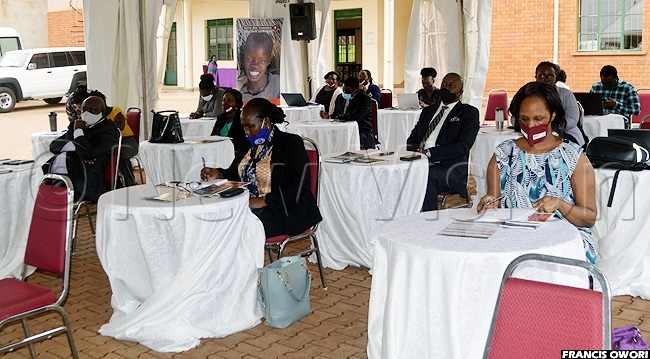
Meanwhile, during the meeting, Gaswaga pointed out that while most of the attention is on the girls in the context of trafficking, the boy child seems to have been sidelined.
"Trafficking is not selective, although the vulnerability of the girl child cannot be played down," responded Wamara, who explained that boys, too, are exploited, only that the dynamics are a bit different.
"The boys you see peddling bananas or eggs on the streets are just one of the many examples. However, there are less cases reported by males - although I am not saying there are not many."
To further bolster the argument that the boy child has not been ignored, Lady JusticeLwanga told of one past case of a boy in Masindi who was captured by some men he knew, and took him to a witchdoctor and had his private parts snipped off.
Later, the perpetrators were arrested, charged and produced in court in what became the first case prosecuted as a trafficking in persons case.
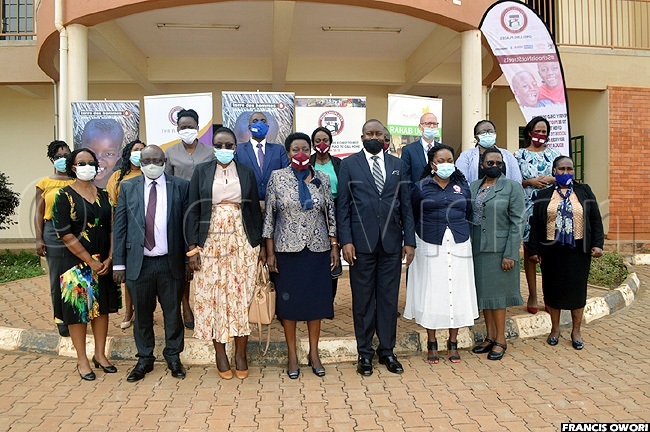
At the conclusion of Wednesday's dialogue, a number of recommendations were made. One is to cause more engagement with the officers in charge at Police's criminal investigations department (CID).
Court registrars should be provided with the trafficking in persons cases as it would be very difficult to convince Government that there are such cases for prosecution.
The meeting also recommended that courtrooms should employ more victim-centred approaches as well as lobby for better laws and harmonization of existing ones.
A push for cases of internal human trafficking to be tried by a specialized court was also advanced.
On the role of judicial officers, Lady Justice Lwanga highlighted the importance of specialized personnel and continuous training in handling of trafficking cases, as well as the use of court open days and other public events as an opportunity to explain and condemn child trafficking in the strongest terms.
Also important is giving deterrent sentences to trafficking convicts and providing victim-sensitive and child-friendly services to victims of trafficking in persons in court.